If you buy through our links, we may earn an affiliate commission. This supports our mission to get more people active and outside.Learn about Outside Online's affiliate link policy
The 6 Best Joggers for Men, Tested in the Real World and In the Outside Lab
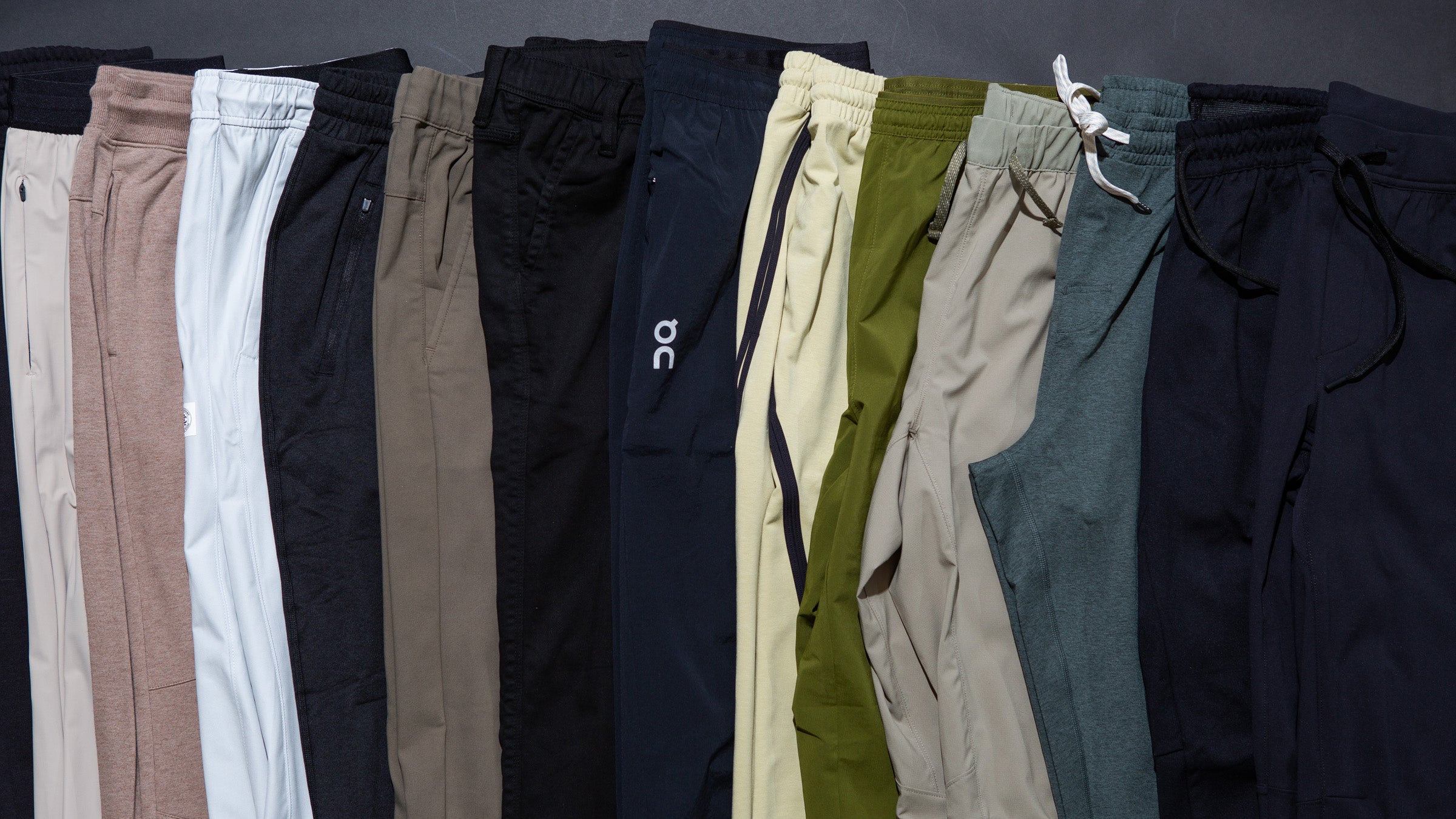
(Photo: Brad Kaminski)
The everyday jogger isn’t as robust as soft shell pants you’d climb a mountain in, nor are they lifesaving items like avalanche airbags or helmets that traditionally get tested more rigorously. But during my decade of working as Outside’s Gear Guy, the tests I’ve enjoyed the most are when we’ve gone deep on everyday pieces of gear, like putting the best joggers for men through their paces.
To test the dickens out of 15 different pairs of joggers, I wore them during all kinds of activities for two months, then teamed up with the Outside Lab at CU Denver to add objective data on durability, stretch, and air permeability to help you find the absolute best men’s joggers for all your needs—from the track to the couch.
At a Glance: Best Joggers for Men
- Best Overall: Ten Thousand Interval Jogger ($118)
- Best for Travel: Patagonia Terrebonne Joggers ($99)
- Most Airy: On All Day Joggers ($150)
- Best Stretch: Vuori Ponto Joggers ($98)
- Most Durable: Reigning Champ Stretch Warp Knit ($135)
- Coziest: DUER No Sweat Joggers ($129)
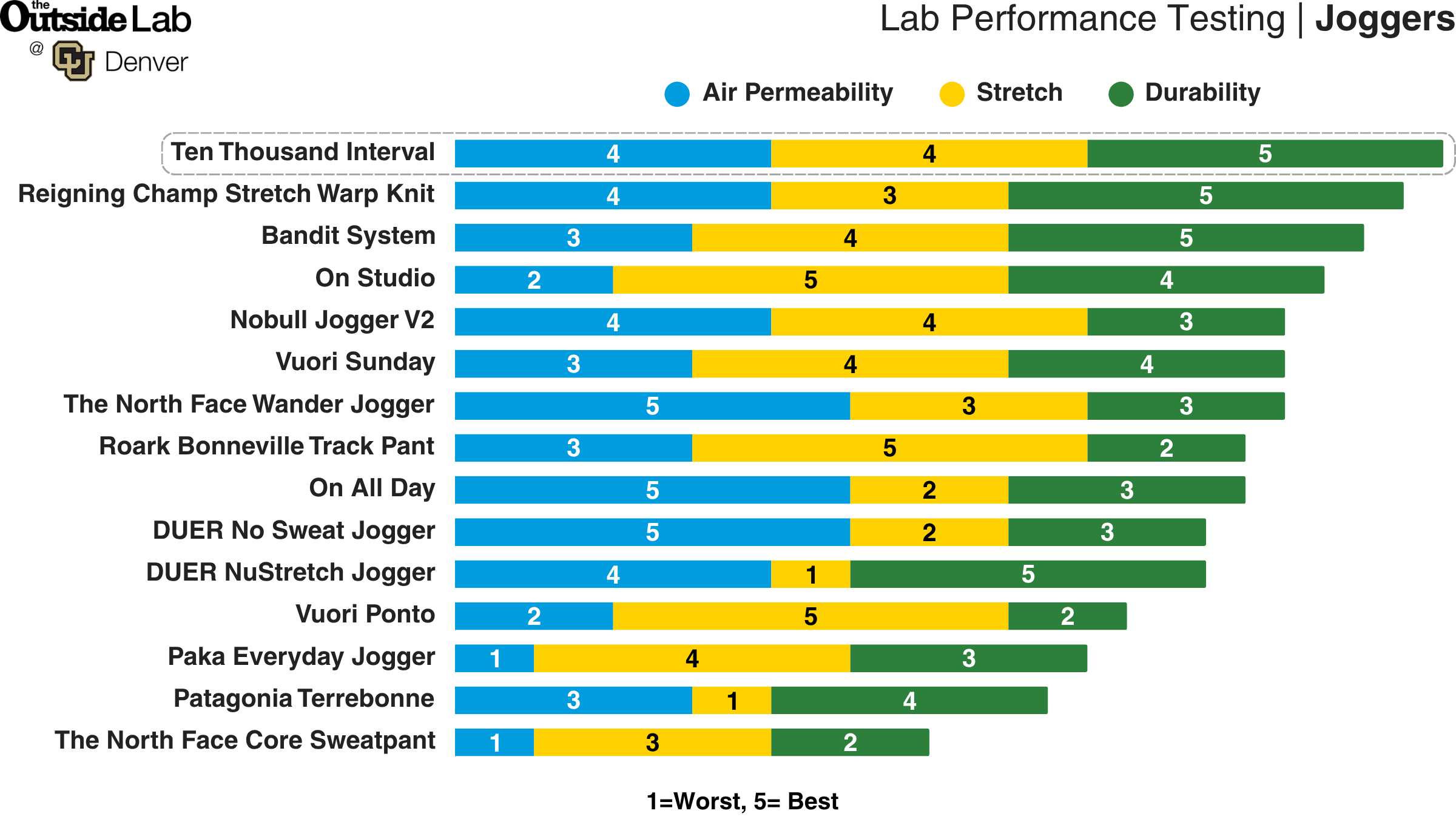
Reviews
Best Joggers Overall: Ten Thousand Interval Jogger
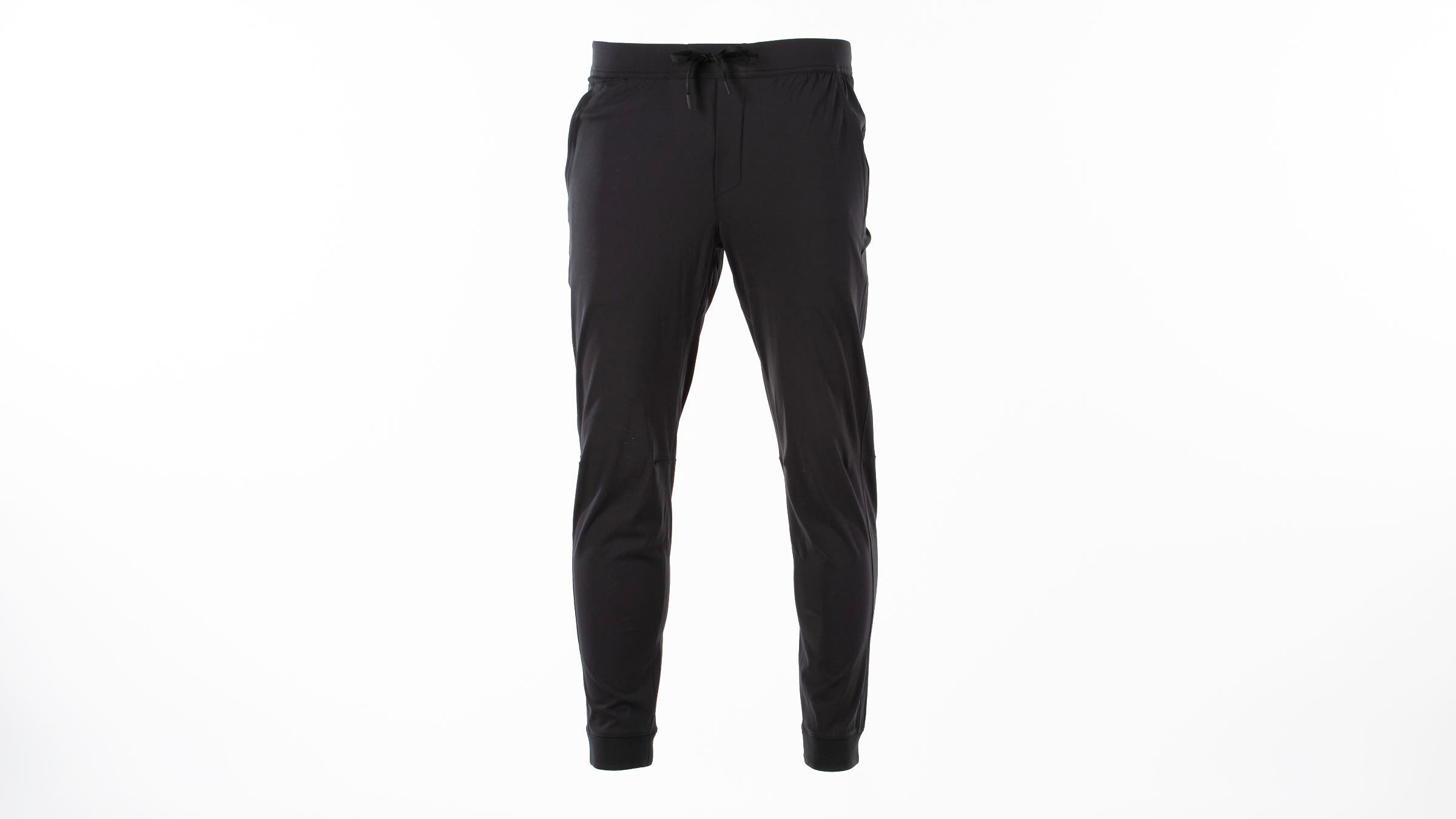
Air Permeability: 4/5
Stretch: 4/5
Durability: 5/5
Pros and Cons
⊕ Versatility
⊕ Comfort
⊕ Tailored aesthetic
⊗ None we could find
Ten Thousand calls this the “most versatile jogger ever,” and I have to agree. In the lab, they received a score of 4 or better on a scale of 5 (1 being worst, 5 being best) for air permeability, stretch, and durability—no other pants graded as high in all three tests, making it easy to award this particular pair the title of best joggers for men overall. Durability and high air permeability are attributes usually in direct competition with each other, but that’s not the case with the Interval jogger. It also impressed during our subjective everyday wear and athleticism tests. It is a true cyborg of a pant that stands out in a wide variety of situations.
The secret is the 4-way Proplyo (Ten Thousand’s proprietary term for their 63-percent Nylon 37-percent Spandex blend) stretch material that didn’t inhibit my deepest squats, and ran like they were built to race in. While weight landed in the middle of the pack at just under 12-ounces, I was surprised at how light they felt when worn in the gym. During my highest intensity workouts they resisted heat build-up and kept me comfortable thanks to their airiness. They also proved comfortable next to skin thanks to a supple fleece-like interior and thick, bunch-free waistline.
Though not a test metric, Ten Thousand absolutely nailed the aesthetic, looking simultaneously slick and casual. The ribbed jogger cuffs and gusset helped them move well without appearing strictly athletic, while the cut hugged the leg, making it more tailored than frumpy. I did not feel like I was taking my kid to school in my pajamas while wearing these—even though I had slept comfortably in them the night before.
Best Men’s Joggers for Travel: Patagonia Terrebonne Jogger
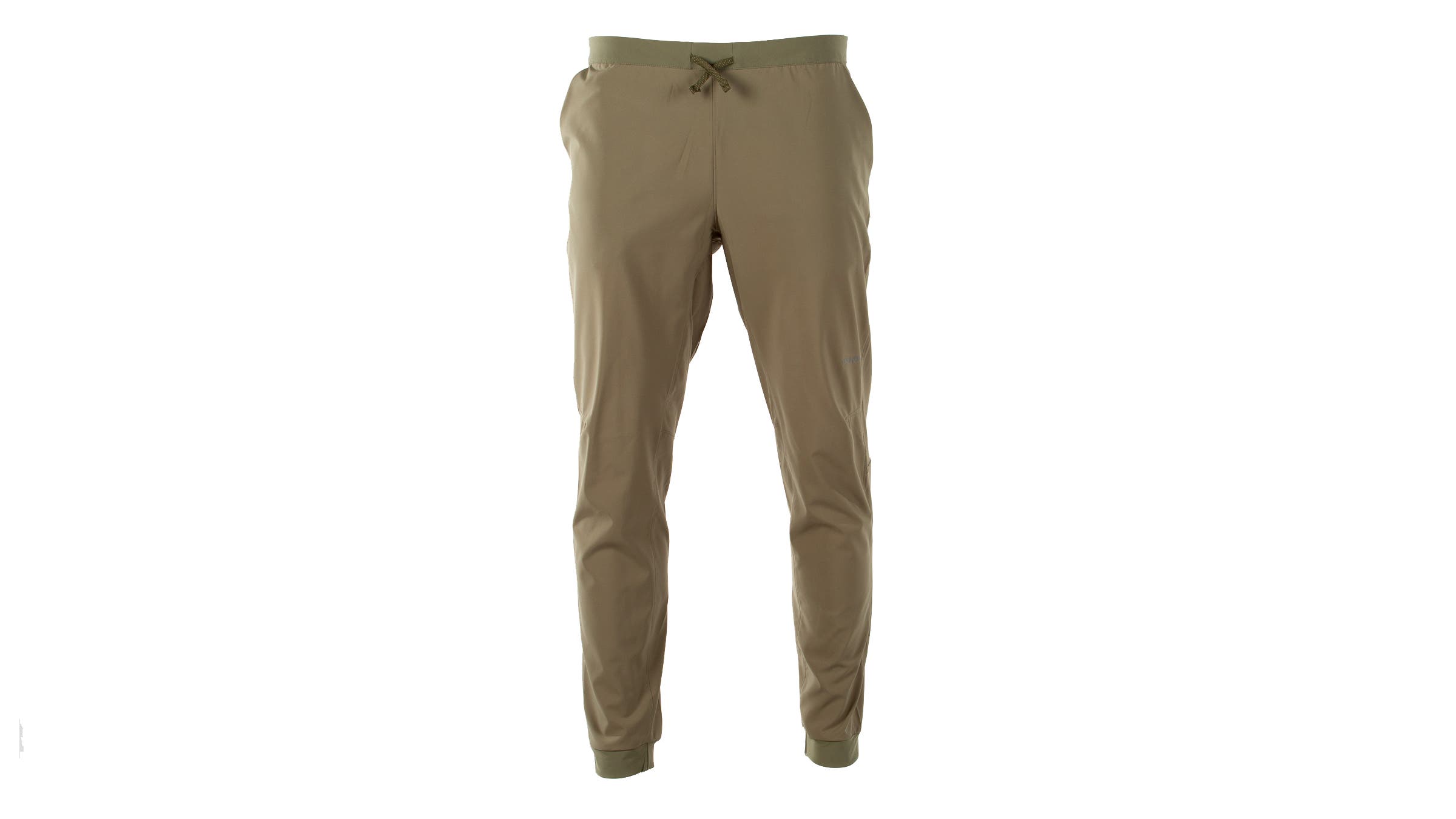
Air Permeability: 3/5
Stretch: 1/5
Durability: 4/5
Pros and Cons
⊕ Ultralight
⊕ Highly packable
⊕ Stylish
⊗ One of the least stretchy fabrics on test
While the Terrebonne didn’t score as high as others in our lab test, they performed above the rest in real-world wear and proved ideal for travel. The Terrebonne Joggers effortlessly walked the line between casual pants that could dress up lightly with a flannel and straight gym pants, thanks to their muted tones, tailored skinny-jogger cut, and ability to dump heat with aplomb during a workout. These joggers are an ideal travel pant as they pack down to the size of a grapefruit, weigh less than a deck of cards (an incredibly light 6.4-ounces), are highly durable, and have a DWR coating which bumps up weather protection. These were the pants I chose to bring on a ski trip to Silverton, Colorado in March—they easily disappeared into my ski pack, letting me change at the end of the day for a more comfortable apres. I wore them every moment of the trip that I wasn’t skiing: flying, meals out, and even sleeping.
Most Air Permeable: On All Day Jogger
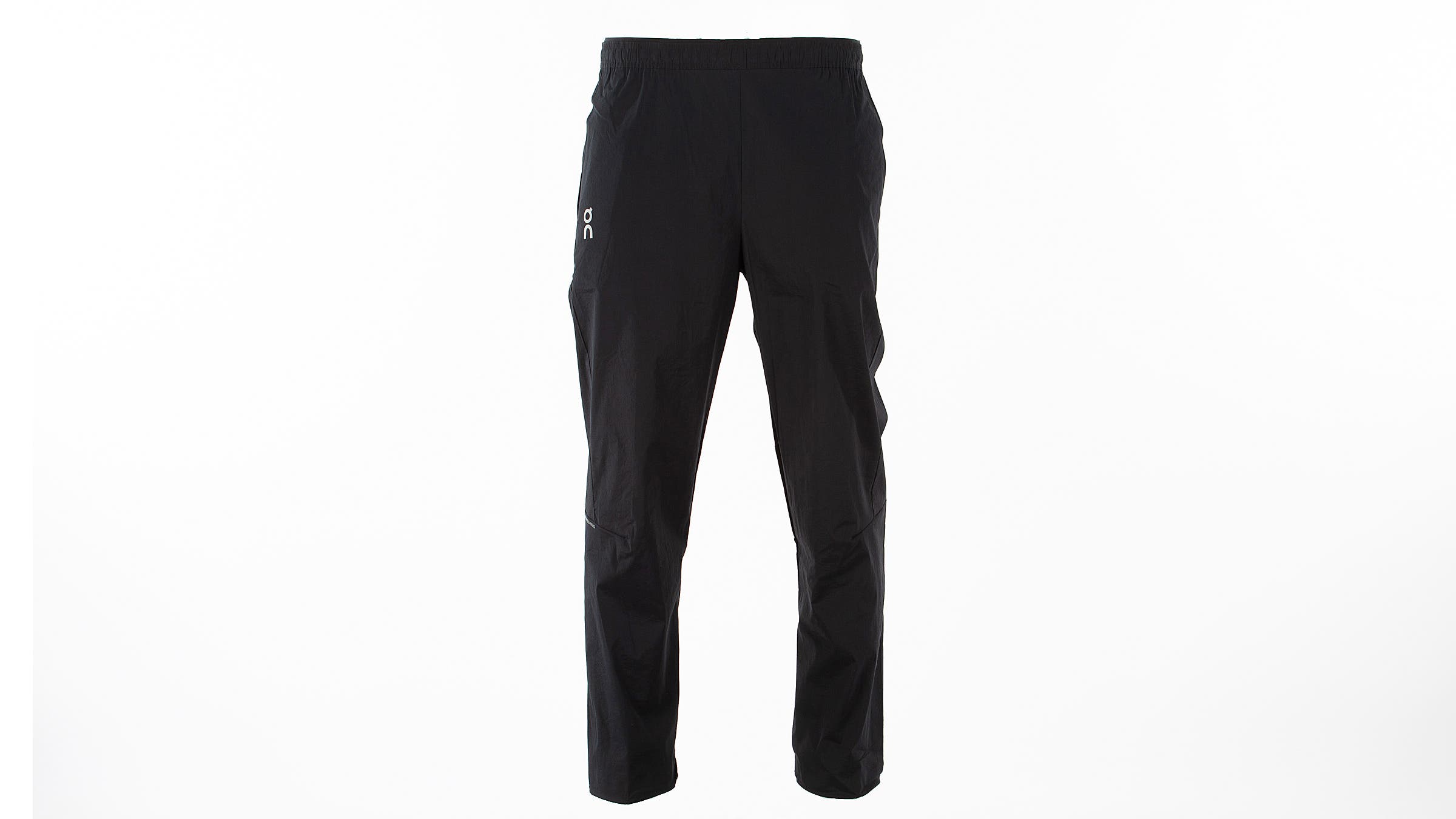
Air Permeability: 5/5
Stretch: 2/5
Durability: 3/5
Pros and Cons
⊕ Extremely airy
⊕ Great for hot conditions
⊗ Price
On’s All Day Joggers are going to be my go-to pants for the entire summer thanks to their remarkable air permeability. They received a top score of 5 in our lab testing, which confirmed my impression when testing in my home gym and on hotter runs (with temps in the mid-70s). No matter how much I turned up the intensity, my legs never overheated; these breezy joggers were built to keep you cool. The 91-percent polyamide and 9-percent elastane material was exceptionally airy, breathed incredibly well in the heat, and stretched easily into high knees in the gym. On pushed the side seams slightly forward on the leg which made them feel like they moved a little more organically with my running gait than the other joggers in this test.
Best Stretch: Vuori Ponto Jogger
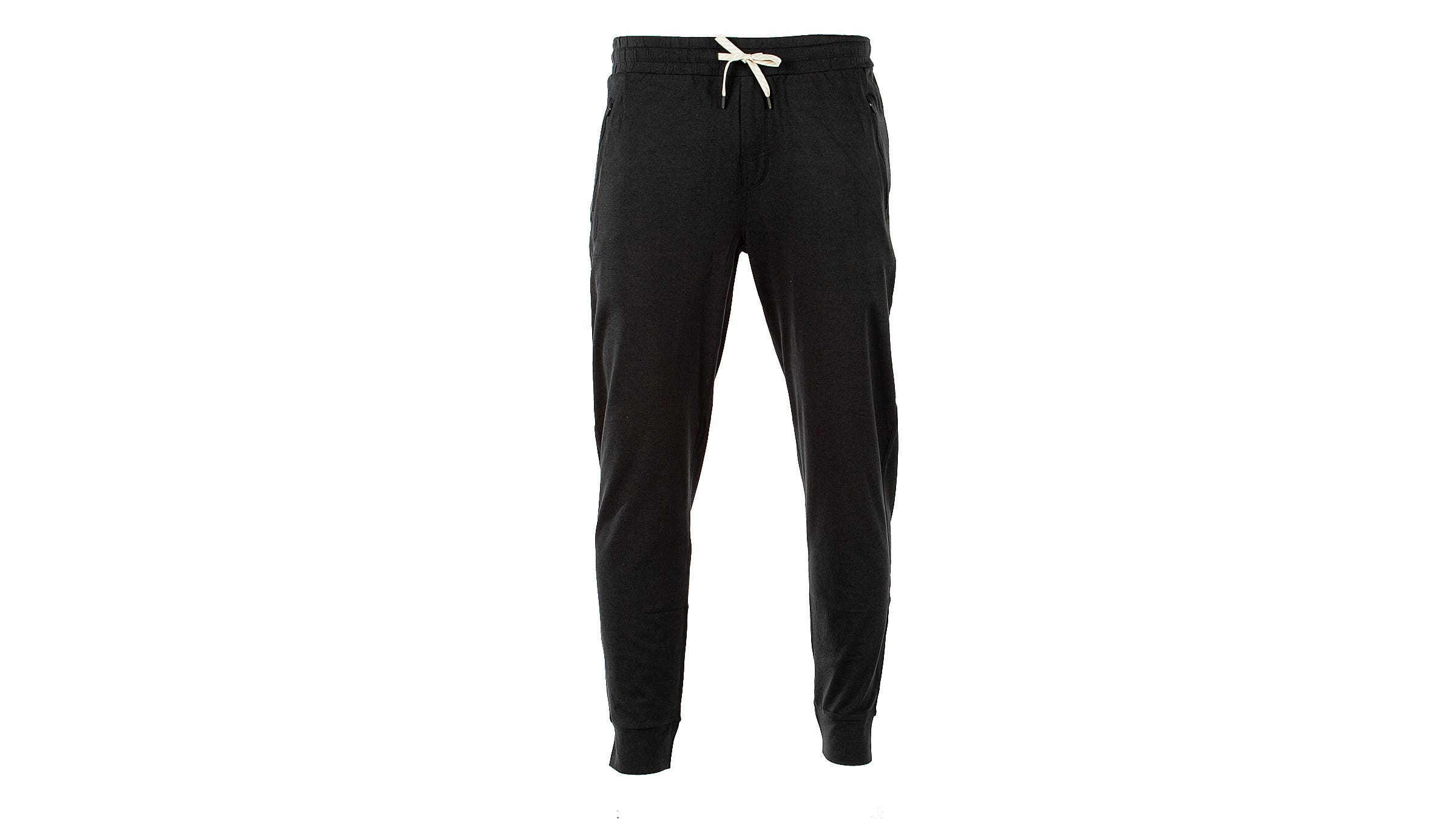
Air Permeability: 2/5
Stretch: 5/5
Durability: 2/5
Pros and Cons
⊕ Stretchiest
⊕ Buttery-soft feel
⊗ Durability against abrasion and piling
I could have put these on blindfolded and told you that they were Vuori pants—I’ve come to expect the Ponto’s remarkable stretch and comfort from the Southern Californian fitness clothing powerhouse. Credit Vuori’s proprietary Dreamknit fabric, made of 89 percent polyester with a hefty 11 percent serving of stretchy elastane mixed in. These were notably stretchier than the other joggers in our test, which made them a standout during transition movements in the gym like box jumps and step ups. Their buttery soft next-to-skin feel was an added bonus and made for a very comfortable pair of pajama bottoms in my sleep test.
Most Durable: Reigning Champ Stretch Warp Knit Coaches Jogger

Air Permeability: 4/5
Stretch: 3/5
Durability: 5/5
Pros and Cons
⊕ Strongest
⊕ Best against piling/tearing
⊗ Fit may not be for everyone
The Stretch Warp Knit Pants from Reigning Champ stood up to our durability tests with the tenacity of a prize fighter, showing incredibly little pilling and no tearing despite taking the significant beating from the Outside Lab. The warp knit material, noted in these jogger’s name, and visible on closer inspection, is largely responsible for the impressive durability under stress while adding style points. On top of proving to be the toughest in the lab, they also received high marks in the stretch and air permeability tests, placing them just behind the overall winner in lab scoring. This mixture of performance qualities was obvious from my first use in the gym: they felt nearly as flexible and unrestricting as shorts during a HIIT circuit that included box jumps, squats, and sprints to failure.
Most Comfortable Men’s Joggers: DUER No Sweat Jogger
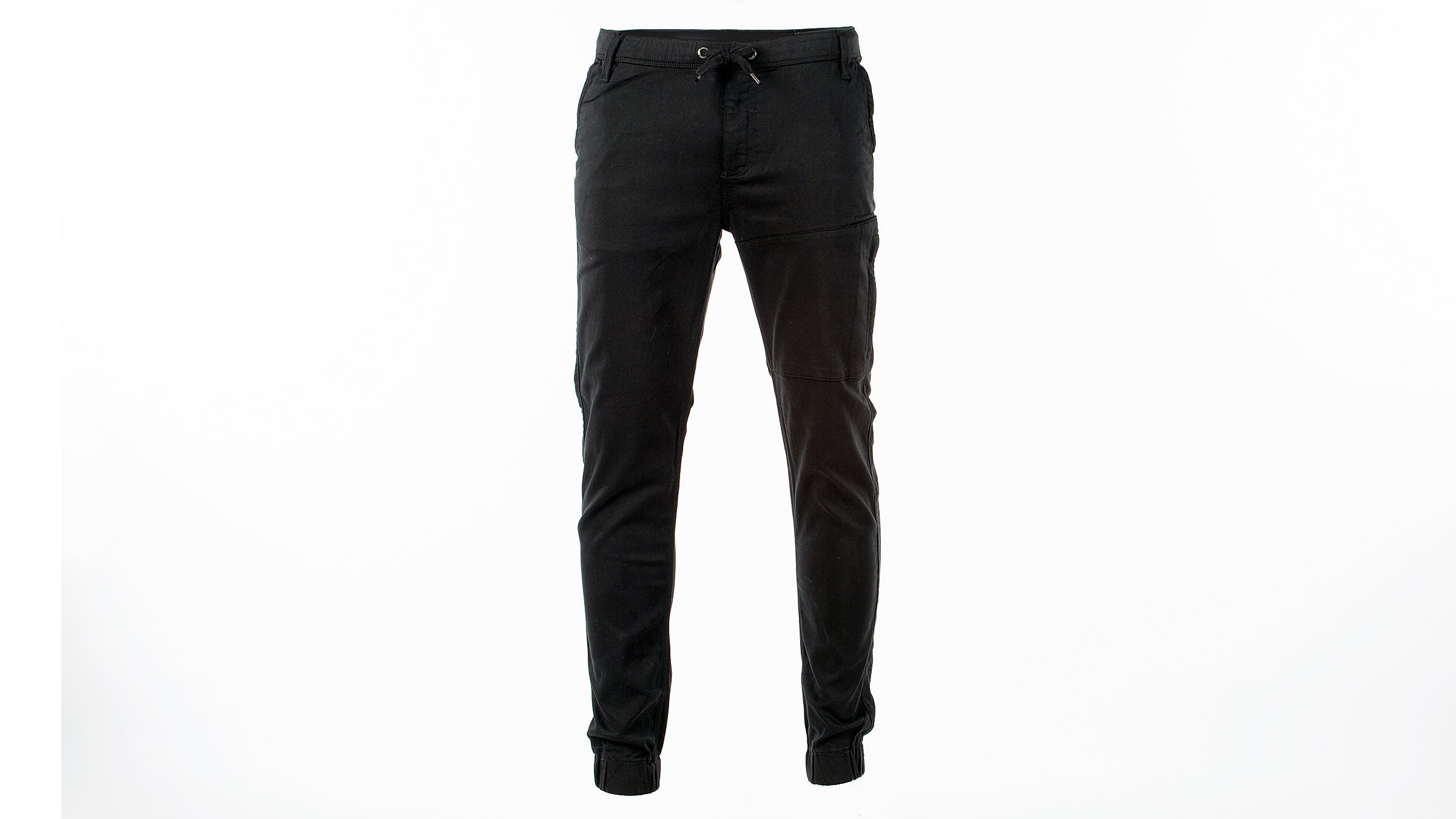
Air Permeability: 5/5
Stretch: 2/5
Durability: 3/5
Pros and Cons
⊕ Heavyweight
⊕ Durable
⊕ Urban style and comfort
⊕ Packability
⊗ Not the best gym option
The No Sweat Joggers stood out in a sea of high intensity, lightweight performance joggers because of their heft. Weighing in at 23 ounces, they were twice as heavy as the mid-range joggers on this list, and nearly four times as heavy as our favorite travel option from Patagonia. I wasn’t disturbed by that extra weight because it came from an incredibly supple, organic-feeling material that was uber comfortable to wear after a ski, run, or ride. DUER uses a blend that includes 62-percent cotton, which made them feel more like the sweatpants of my youth—in a good way—and delivered a non-synthetic look that helped them dress up more than the others on test. Though the material didn’t do these joggers any favors in our lab stretch test, DUER put a nice gusset in the crotch that helped them move well enough for squats and box step ups.
Other Men’s Joggers We Tested
- Vuori Sunday Performance Jogger ($98)
- Bandit System-R Jogger Pants ($125)
- On Studio ($100)
- The North Face Core Sweatpant ($60)
- The North Face Wander 2.0 ($70)
- Roark Bonneville Track Pant ($105)
- Nobull Jogger V2 ($109)
- DUER NuStretch Jogger ($119)
How We Tested the Best Joggers for Men

In The Outside Lab at CU Denver
Durability
To test the fabric from each jogger for durability, we used a Martindale abrasion machine that rubs materials together to look at wear. First, we rubbed the joggers with a plain weave wool fabric—following the ASTM D4966 industry test standard—to mimic typical wear and tear for 50,000 cycles (about 25 miles). Second, we used a more severe abrasive to replicate rough surfaces and snags and to speed up material destruction.
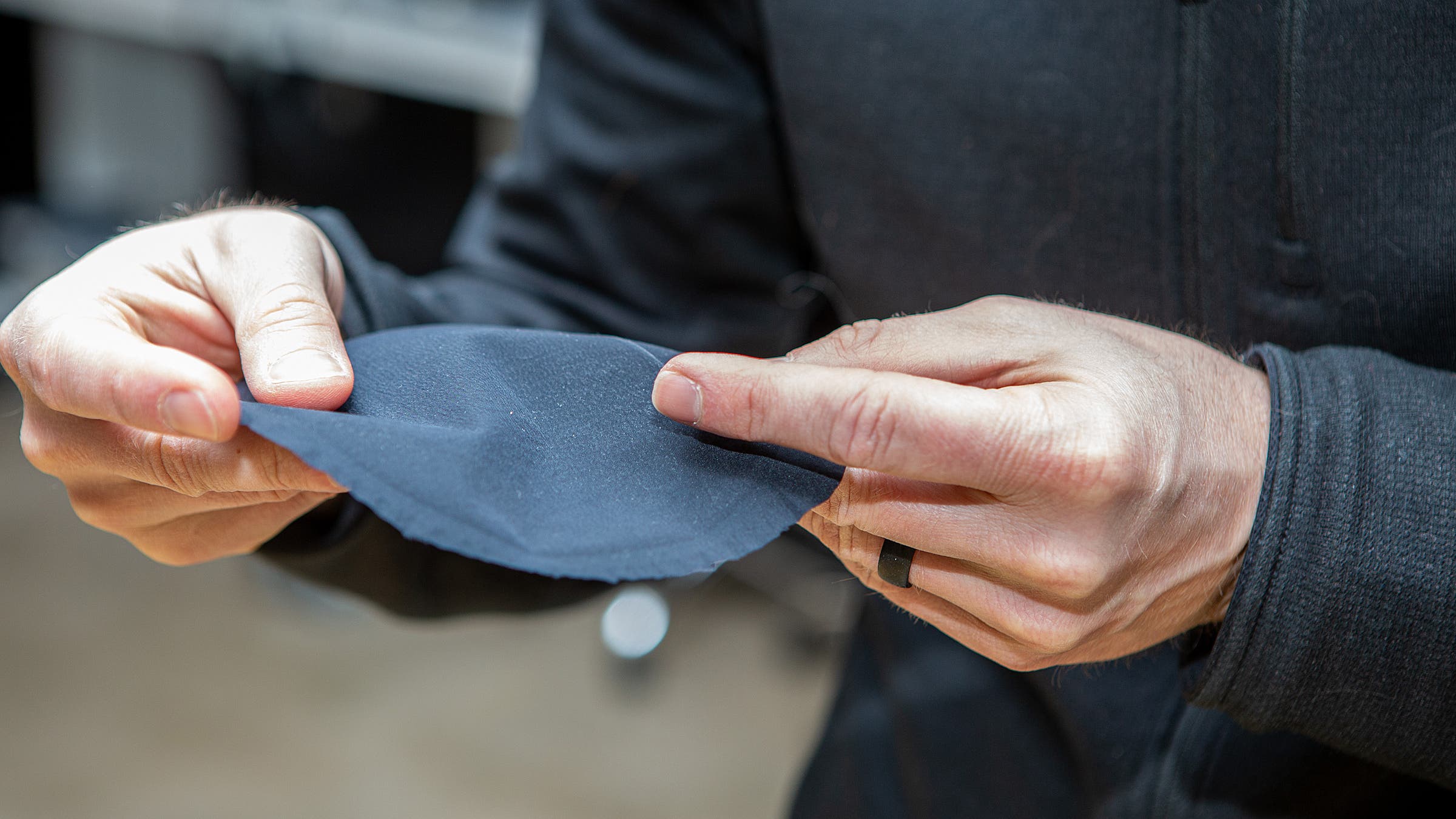
The joggers’ materials were graded on a visual scale of 1 to 5 for each test. Top performers with very little or no change to the material scored a 5. Samples that ripped or completely changed in appearance and feel (excessive color fade, noticeably thinner, allows more light through, different to the touch) received the worst score of 1.
Stretch
Using a universal testing machine, samples were pulled (stretched) for 30 millimeters, or just over one inch, while measuring the force needed to do so. Material swatches were cut from the knee area on the front of each jogger and stretched both vertically and horizontally. This amount of stretch is on the high side during normal wear, but we like to test the limits for a thorough comparison. To keep the test realistic to wear, minimal “pre-load” (adding tension before the test start) was used to replicate a person standing straight with the jogger on and then beginning to stride, squat, or generally move.
Results were graded on a 1 to 5 scale based on the maximum recorded force, with 5 being the stretchiest (least amount of force needed) and 1 the least stretchy (most force needed). Since samples were tested in two directions, the grade represents the combined overall performance. Note that this test is only of the material stretchiness; the cut and fit of each jogger can aid the feeling of “stretch” when wearing.
Air Permeability
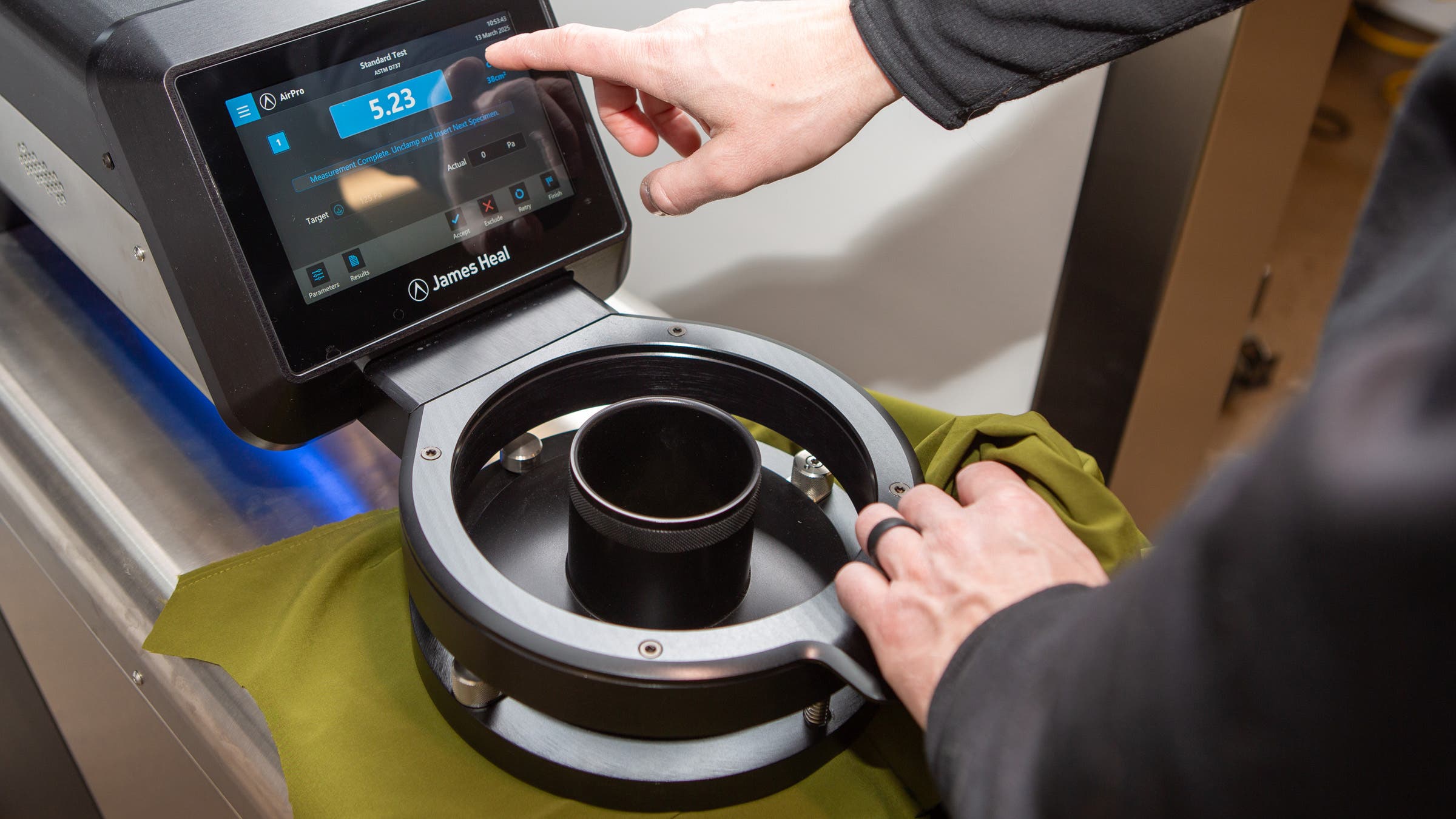
Air permeability tests how much air (in volume) is able to move through a fabric—think resistance to wind. This is different from “breathability”, which deals with moisture vapor (sweat) and how effectively it transfers through a material. The more permeable a material is, the breezier it will feel when worn. Each jogger was tested at five different locations with a James Heal AirPro, a machine that uses a vacuum pump to pull air through the fabric while measuring the flow rate.
The average result of the five test locations was calculated for each jogger resulting in a grade of 1 to 5, least to most airy.
Testing the Best Joggers for Men in the Field
Everyday Wear
I wore these joggers for two months as my only pants, save for a few special occasions (a rare in-person meeting, the opening of a play, and a few date nights). Since I work from home, live in a place where people rarely dress up, and am a generally casual person, I was able to really commit to the jogger life. Notes were taken during this two-month stretch on how each pair looked and felt.
Overall Comfort
I not only took notes on comfort during the day, but I also slept in each pair. I’m a light sleeper and incredibly picky about what I wear to bed. The sleep test, for me, is one of the best opportunities to figure out the nuanced details of comfort.
Athleticism
I ran a three-mile loop from my home in each of these joggers and took notes on how they performed. I also worked out in my home gym with each, doing sets of squats, box step-ups, and deadlifts to test how the material moved.